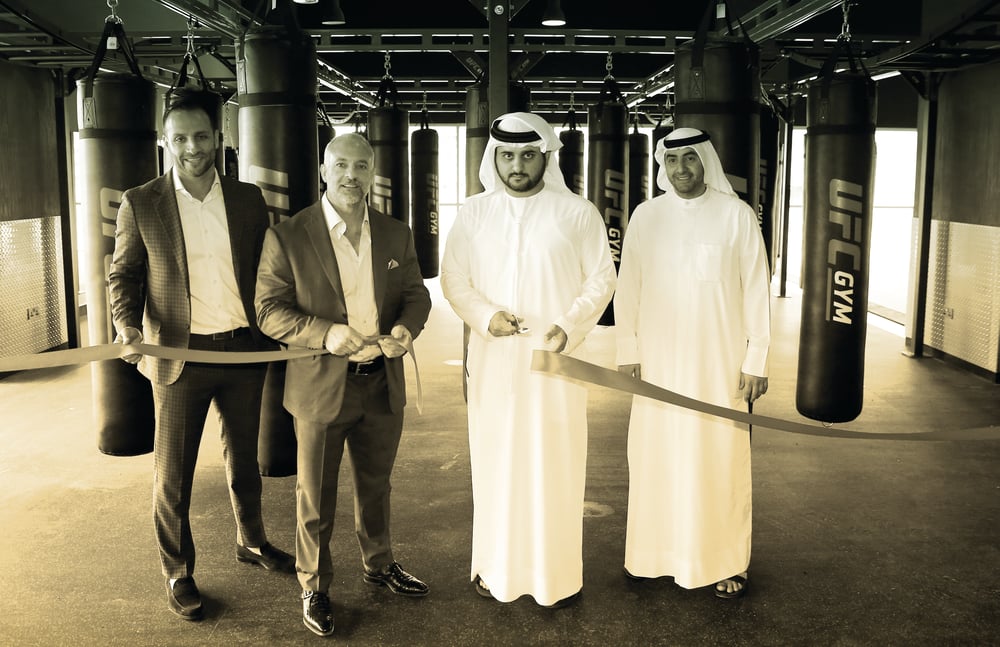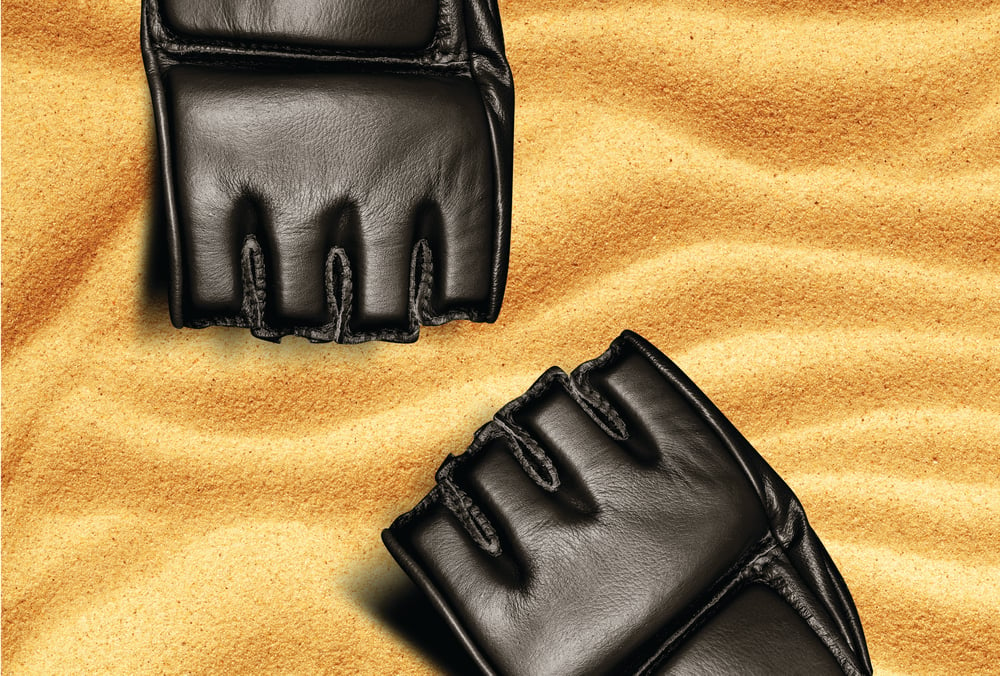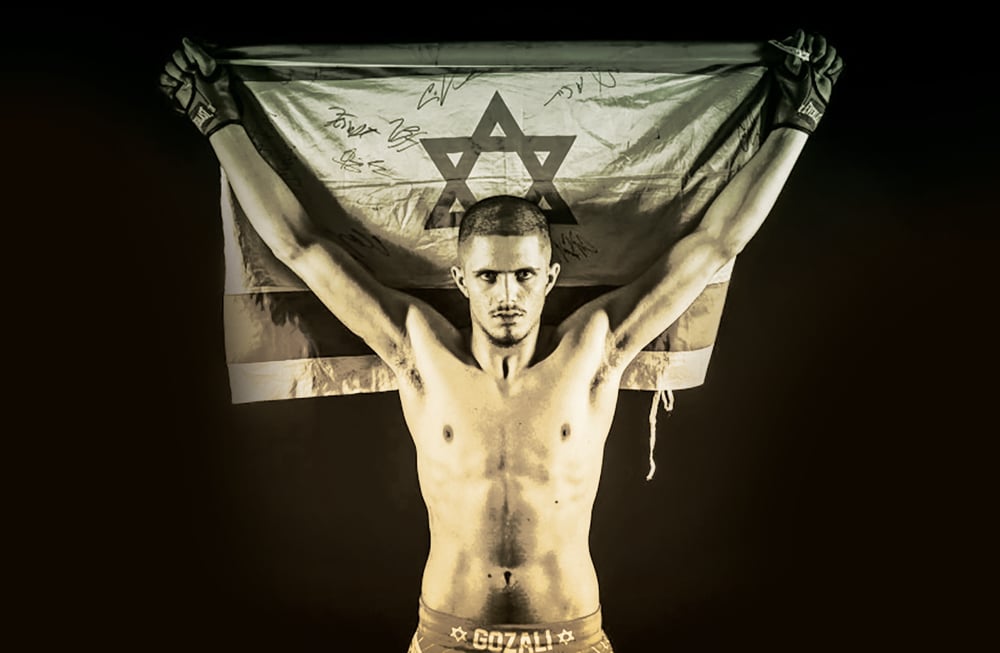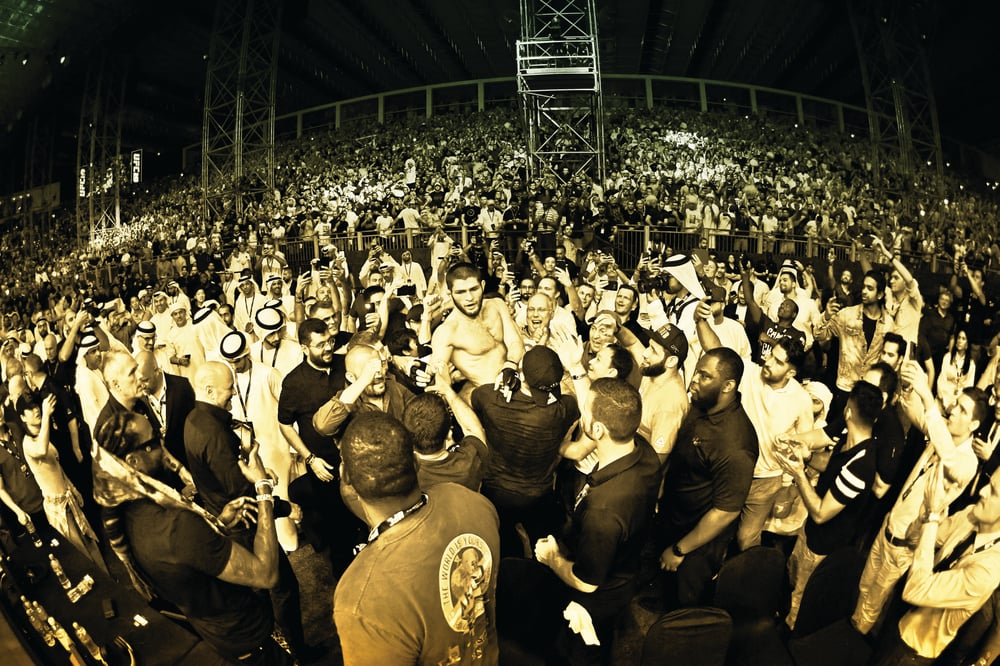
Issue 187
January 2020
With royal patronage and fanatical interest from the people, Mixed Martial Arts has a strong base in the Middle East. but now conditions are right for the region to become a global player in the sport and turn dreams into reality
Speak to those who know the Middle East and there is the powerful view that the region is a sleeping giant when it comes to mixed martial arts, and like the sport itself, grappling is its cradle. With royal patronage, and jiu-jitsu enjoying a place on the school curriculum in some of the states in the United Arab Emirates, the future is secure.
But when exactly will the slumbering giant actually awake? The history of the development of MMA in the Middle East region is fascinating, even having a romance in some ways akin to the Gracie family’s form of Brazilian Jiu-Jitsu which found its way to the United States, and beyond, the catalyst for the burgeoning sports entertainment industry it has become today.

Renowned combat sports film maker, Bobby Razak has been in and out of the territories making adverts, films and documentaries for many years, and he told Fighters Only: “The UAE I consider to be a major incubation hub for the development of MMA, and especially submission fighting and submission grappling. What Sheikh Tahnoon created with the ADCC wrestling is unique and what he created has become the Olympics of grappling in terms of what happens every two years. The ADCC houses the finest submission fighters, wrestlers, Brazilian Jiu-Jitsu players around the world and they compete in the most prestigious tournament. This is really the base of the wider development of our sport in the region.”
Tahnoon – known as the black belt Sheikh, or the Godfather of jiu-jitsu in the zone – is an amazing story himself, a personal journey which has becoming a pioneering passion, involving personal and global investment. The UAE’s Sheikh Tahnoon Bin Zayed Al Nahyan – to give him his full title – created the ADCC World Submission Fighting Championships, born from a time when he was studying in America.
It coincided with the first UFC event in 1993, in Denver, Colorado, and the craze of the new jiu-jitsu art captured his imagination. Two years later, he was learning himself at Gracie Barra San Diego with Nelson Monteiro becoming his teacher. He proved one of the most dedicated – and humble – of the students, cleaning the mats, never revealing his royal lineage. That came much later, by which time he was already a treasured member of the BJJ tribe.
By 1998, Sheikh Tahnoon would return home to Abu Dhabi as a skilled practitioner looking to build a legacy there, and by the early 2000s, had his black belt under Renzo Gracie. He created the ADCC – the Abu Dhabi Combat Club – the acronym which now stands for world class grappling competition, and it become the hub, the beacon for martial arts in the wider region.

His interest grew and grew, and in early 2010 Sheikh Tahnoon bought a stake in the UFC, with new focus on jiu-jitsu from Sheikh Tahnoon’s older brother, Sheikh Mohammed bin Zayed, Crown Prince of Abu Dhabi who was also the Deputy Supreme Commander of the Armed Forces. He came up with the plan of having jiu-jitsu on the curriculum at UAE schools.
“His Royal Highness watching UFC 1 and being inspired by all things mixed martial arts, no holds barred and starting to train in BJJ with Nelson in San Diego, had the roll on effect of him loving the UFC, and subsequently putting time and money into the development of martial arts in their various elements,” recalls Razak. “But that also included investment in the Pentagon Fighting Championships in Brazil and eventually the ADCC. So he’s an incredible force in the development of martial arts not just in the Middle East, but globally,” adds the film-maker.
Marc Goddard, the renowned MMA referee, has had many dealings in his sporting capacity with the Middle East in the last decade. “I’ve been fortunate enough to have been traveling to the Middle East for ten years now, all around the UAE and GCC countries with Cage Warriors, Desert Force, Abu Dhabi Warriors and obviously with the UFC. I was there with the UFC’s first ever stint, to Abu Dhabi and of course the big celebrated return this year. I think it is still emerging – I classify the UAE and the Gulf/Middle East as an emerging market for MMA. In terms of star power, some of the most intense, passionate crowds I have ever witnessed or experienced are in the UAE, even on the smaller shows.”
The UFC has enjoyed sporadic, yet fruitful journeys to stage events in Abu Dhabi. First up there was one of the greats, Anderson Silva, headlining against Demian Maia in 2010 in a bizarre middleweight title defence. His antics, toying with his fellow Brazilian in the main event, angered the UFC top brass in what was meant to be a showcase moment.

It took a few years before the UFC then announced a new, major expansion into the Middle East – that was 2014 – after entering into an exclusive partnership with FLASH Entertainment, the region’s government-backed live entertainment producer and promoter, to deliver live UFC events as part of a two-year agreement. The plan was also to bring The Ultimate Fighter to the region, giving aspiring athletes the opportunity to develop and compete for a contract with the world’s fastest-growing sports organization. It was part of a developing growth in several sports in the region including F1, the FIFA World Cup and ATP Tennis.
At the time, Garry Cook, then Executive Vice President and Managing Director of UFC EMEA, who had had relations with the royal families from his time at Manchester City Football Club, explained to me: “This agreement is a major step in our strategic expansion across EMEA and, in particular, will see our audience grow dramatically across the region. There is a huge market for the UFC in the Middle East; the fans want live events and can now look forward to local tailored content in the region.
John Lickrish, then Chief Executive Officer at FLASH Entertainment, had explained: “FLASH Entertainment has been proud partners of the UFC for many years, stretching back to the historic UFC 112 event in Abu Dhabi in 2010. The announcement today heralds a bright future for the millions of fight fans and practitioners alike across the Middle East and North Africa, as we work together to develop a program of year-round UFC events. We look forward to making further announcements very soon.”
It has obviously taken time to bed into the region but with the extremely high-profile Khabib Nurmagomedov and Dustin Poirier contest heading there this year in a lightweight title unification match, it was just the third time, but the most high profile and impactful event in the region thus far. The UFC will now stage one event a year in Abu Dhabi, which holds most of the UAE’s oil wealth, over the next five years.
“They (Abu Dhabi) are making a huge commitment to grow the sport,” UFC Chief Operating Officer Lawrence Epstein told reporters in September, a move which falls into line with many of the Gulf Arab states beginning to invest in all the sports and entertainment industries. Saudi Arabia has a multi-year deal with World Wrestling Entertainment and boxing events are also beginning to make an impact, notably the world heavyweight title rematch between Britain’s Anthony Joshua and Mexican/American Andy Ruiz, for which a purpose-built 16,000-seater stadium was built in Riyadh.

But the reality is that while the major MMA leagues, such as the UFC, bring global eyes to the region, not forgetting that Bellator have been staging regular events in Israel, other local fight leagues are making an impact. Four years after it was established in Bahrain, Brave Combat Federation (BRAVE CF) is one of the fastest-rising smaller MMA organizations in the world.
They are still feeder leagues for the major organizations. Brave Combat Federation’s founder Sheikh Khalid Bin Hamad Bin Isa Al Khalifa, who is the son of Bahraini ruler, King Hamad Bin Isa Al Khalifa, and a graduate of the UK’s prestigious Sandhurst military academy, believes in MMA. What they want to do is develop local stars. As indeed does the UFC.
“We’ve done events here in the past, bringing in global UFC stars, and that’s been very successful. But having an athlete that’s both a star and has a local following is even better,” Epstein believes. Therefore, Nurmagomedov was perfect. “He’s a Muslim athlete and has spent a lot of time in the region. That makes him really attractive here. Our goal is to expose as many people to the sport of MMA and the UFC brand. Having an athlete cut through and that gets people interested in a particular region is going to help us accelerate that growth.”
In the next five to seven years, a new star is almost guaranteed from the region. Outside Brave, there is the Lebanese Phoenix promotion and both have strong relationships with the two major global players in amateur MMA, the IMMAF and the WMMAA.
The International Mixed Martial Arts Federation (IMMAF), and the WMMAA, want world and Olympic recognition for the sport of MMA. This federation has partnered with Bahrain and had its world championships there this year.

“When you get the big marquee events, involving the likes of Khabib Nurmagomedov, you get the ex-pat contingent, the Russians, Dagestanis, and so on, in and around the UAE, the event becomes huge,” explained referee Goddard to Fighters Only. “Khabib was the safest, most obvious choice to headline the UFC when they went back to Abu Dhabi, but there’s a lot of smaller, regional promotions, dotted around historically. Desert Force was one, Phoenix was short-lived, Cage Warriors used to give great exposure to local fighters back in the day too. Abu Dhabi Warriors was another local promotion, and of course all the more embedded aspects like jiu-jitsu being on the school curriculum, particularly around Abu Dhabi will have deep effects on the genuine growth and interest in the sport from a base level.”
Those are the seeds that will grow for the future, allied to the long-term practitioners from the Abu Dhabi Royal Family. “Jiu-jitsu is and will, remain a huge part of the sport and a will always have a big following in the UAE,” adds Goddard. “But I would still classify MMA as an emerging sport in the overall region. There’s not really any standout stars, lots of pockets of fighters from Lebanon, Abu Dhabi, Kuwait, and all the surrounding nations, but I think it is with the UFC’s resurgence and the deal again with Flash Entertainment (with the promise of three or four shows in the region annually) we could see faster growth on the back of that and a relative growth spurt from that region. But we have been saying the same about China. But on a personal level, I’ve always had positive experiences in the UAE. I love travelling out there and going out there.”
No doubt that comes from the initial nurture the sport was given under royal patronage, lovingly and carefully curated with the vision. But as the sport is on the cusp of growing in the Middle East, Razak told Fighters Only that he believes Sheikh Tahnoon’s place in its history should never be forgotten.
“The Sheikh is such a revolutionary in martial arts,” Razak explained. “He owned a percentage of the UFC at one point. He loved it so much, the UFC affected him so much, at a time when MMA needed an injection of money and cash, he was there. He invested. That’s huge. So the roots of Sheikh Tahnoon in the UFC and in MMA are incredible, and should never be forgotten.”
Remarkable, really, and it simply goes back to that old adage of ‘Build it, and they will come.’ The foundations have been set. The times are changing, the investment is there, and the big league has promised. The only thing missing now is a handful of household names, and the sport will explode. They are there, those stars, honing their skills in the gyms and on the mats. It is not so much if, but when. We know that.
“The Middle East will see the coronation of a global champion in the next decade. Guaranteed,” said Goddard. “Everything’s in place. It’s simply a case of when...”
...









